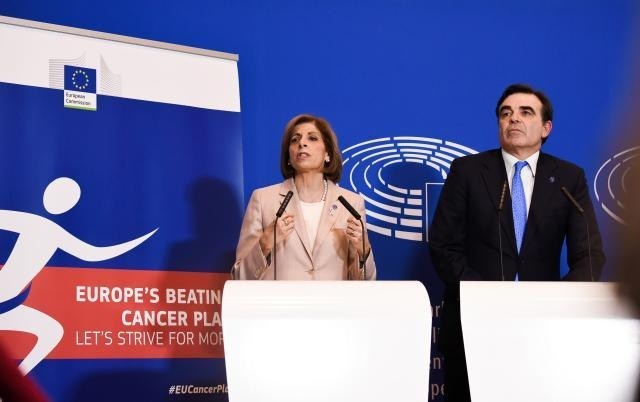The European Commission presented on Wednesday a plan to beat cancer by a new approach to prevention, treatment and care of the disease. The plan comes ahead of the World Cancer Day tomorrow.
Europe's Beating Cancer Plan will be supported by four key action areas and implemented using the whole range of Commission funding instruments, with a total of €4 billion. The plan spans across policy areas from employment, education, social policy and equality, through marketing, agriculture, energy, the environment and climate, to transport, cohesion policy, and taxation.
Prevention includes actions addressing key risk factors such as tobacco, harmful alcohol consumption, environmental pollution and hazardous substances. Additionally, a ‘HealthyLifestyle4All' campaign will promote healthy diets and physical activity.
To prevent cancers caused by infections, the Cancer Plan's objective is to vaccinate at least 90% of the EU target population of girls and to significantly increase the vaccination of boys by 2030.
Early detection of cancer will be achieved by improving access, quality and diagnostics and support Member States ensuring that 90% of the EU population who qualify for breast, cervical and colorectal cancer screenings are offered screening by 2025. To support achieving this, a new EU-supported Cancer Screening Scheme will be put forward.
Diagnosis and treatment include actions to ensure better integrated and comprehensive cancer care and addressing unequal access to quality care and medicines. By 2030, 90% of eligible patients should have access to National Comprehensive Cancer Centres linked through a new EU Network.
In addition, a new ‘Cancer Diagnostic and Treatment for All' initiative will be launched by the end of 2021 to help improve access to innovative cancer diagnosis and treatments and a European Initiative to Understand Cancer (UNCAN.eu) will help identify individuals at high risk from common cancers.
“In 2020, while we were all fighting against the COVID-19 pandemic, many of us were fighting a silent battle, the battle against cancer,” Commission President Ursula von der Leyen said. In 2020, we lost 1.3 million Europeans to this disease. And sadly, the number of cases is on the rise.”
According to figures from the Commission, 2.7 million people in the EU were diagnosed with the disease last year. Without conclusive action, by 2035 cancer cases are estimated to increase by almost 25%, making it the leading cause of death in the EU.
Moreover, the COVID-19 pandemic has had a severe effect on cancer care, disrupting treatment, delaying diagnosis and vaccination, and affecting access to medicines.
The plan also touches on improving health promotion through access to healthy diets and physical activity. “Marketing and advertising are designed to influence the choices consumers make.”
The Commission is among others undertaking a review of the promotion policy for agricultural products, with a view to enhancing its contribution to “sustainable production and consumption, and in line with the shift to a more plant-based diet, with less red and processed meat and other foods linked to cancer risks and more fruit and vegetables”, as step that is welcomed by Compassion in World Farming.
“We applaud Health Commissioner Stella Kyriakides and those working on this important work for the health of EU citizens,” commented Olga Kikou, Head of the NGOs EU office. “In this path, the EU can do better by taking a more holistic approach to improving our diets, besides tackling tobacco and alcohol use. “
This can be done, according to the NGO, by overhauling the upcoming revision of marketing and advertising rules.
“If the EU is to truly deliver on its commitments to improve our health, the lives of animals and save our one and only planet, then targets for reduction in the consumption of ALL animal products – not just red and processed meat – are necessary, accompanied by targets for an increase in consumption of plant-based foods.”
The Brussels Times

